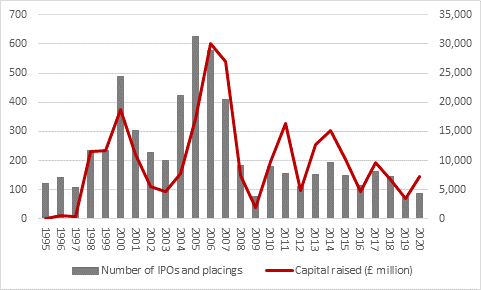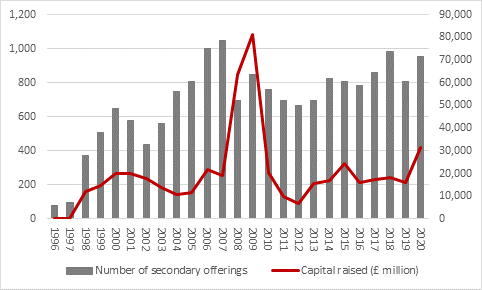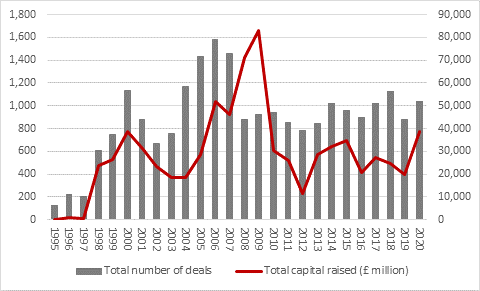“The announcement of planned by stock flotations by Moonpig, Foresight Group and Dr Martens in the space of two days could be a good sign. They suggest that capital markets are working well and doing what they are supposed to do, which is provide capital that companies can use to invest and hire, create wealth and ultimately help the economy to grow,” says Russ Mould, AJ Bell Investment Director. “Investors are also always intrigued by a new stock market entrant. Initial public offerings (IPOs) can represent a chance to buy into a new, exciting story that generates capital gains or welcome income over the long-term, or at least make a quick turn if a deal looks like it is going to be hot and the shares are going to spike.
“However, there can be a downside too.
“There is an old market saying that ‘bull markets end when the money runs out’ and a sudden torrent of new listings, or secondary sales of stock by major shareholders in companies that are already quoted, can therefore be a warning sign, too.
“Investors certainly need to take each deal on its merits and carefully assess the strength of a company’s competitive position, the integrity and acumen of its management team and the solidity of its balance sheet, before taking a view on the valuation and whether it means the stock is coming to them at a price which provides both upside potential and downside protection.
“Not surprisingly given the circumstances, and especially last spring’s stock market rout, newcomers the London market were relatively few and far between, although the pace did pick up and the second half and some deals, such as THG, proved to be absolute winners.
“Overall, the number of new issues and IPOs in London last year was the second-lowest since 2009 and the end of the Great Financial Crisis, according to data from the London Stock Exchange (only 2019 was lower).

Source: London Stock Exchange
“Over £7 billion was raised by primary offerings, the highest figure since 2017 and that exceeded the sums generated by market newbies in 2009, 2012, 2015, 2018 and 2019.
“And with only a select number of names announcing plans for an IPO so far in 2021, it is too early to be pressing the panic button about a deluge of new issues swamping investors and snuffing out the UK market’s attempt to forge a sustained bull run.
“The £7.3 billion raised in 2020 came nowhere near the £31 billion of 2006 and £27 billion of 2007, right before trouble hit and the bear market began, or the £18.7 billion peak of the prior cycle in 2000.
“But investors need to be on their guard. The US market has shown signs of an over-heated new offerings market, especially given the post-listing surges in names such as Airbnb and DoorDash, the torrent of new Special Purpose Acquisition Companies (SPACs) coming to market and the lofty valuations at which many new entrants have gone public.
“The UK is showing no real signs of any of those, which is reassuring, although investors will also want to keep an eye on secondary offerings too, since they also soak up cash that could otherwise be deployed elsewhere.
“Over 950 secondary deals, including rights issues, placings for cash, open offers, subscriptions and further issues took place in 2020, perhaps understandably as many companies tapped their shareholders for fresh liquidity to help see them through the pandemic and the subsequent recession. London-listed and quoted firms raised over £31 billion, the highest figure since 2008-09 when companies were again in cash-raising, crisis-management mode.

Source: London Stock Exchange
“That meant the total cash raised across primary and secondary deals reached nearly £39 billion, again the highest mark since 2009. Couple that with hefty cuts to dividend payments and a collapse in share buyback activity and it is no surprise that the UK stock market’s headline indices struggled to make headway in 2020.

Source: London Stock Exchange
“Dividend payments are expected to rebound this year and buyback activity could conceivably start to pick up, too, should the global economy really begin to gain traction in the wake of vaccination programmes.
“This remains far from certain, however, and investors do need to be on their guard in case the steady flow of new deals becomes a flood, especially if deal quality starts to flag and certain hot or popular sectors witness very high levels of activity. This is not a problem in the UK, as Foresight Group, Dr Martens and Moonpig all come from different sectors and industries, but investors might like to bear Warren Buffett’s warning in mind, if copycat deals start to proliferate:
‘First come the innovators, who see opportunities that others don’t. Then come the imitators who copy what the innovators have done. And then come the idiots, whose avarice undoes the very innovations they are trying to use to get rich.’”
